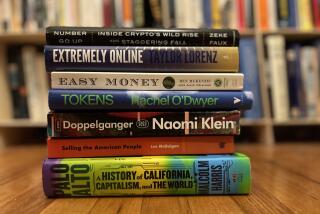Cast Wary Eye on the Age of the Internet
- Share via
Early last year, the chief economist for one of Europe’s leading banks stunned an exclusive dinner party in Beverly Hills with tales of the coming Y2K disaster. Planes might fall from the sky, financial systems could crumble and nuclear weapons suddenly explode as the century went into double zero.
The next day, I ran into Peter Norton, whose earnest face adorns a number of software utility packages bearing his name. He knows as much about computer glitches as anyone, and I asked him if panic was in order. Being committed, above all, to reason, he chuckled and said no, the basic computer problem was obvious and fixable.
But that eminently sensible view held by Norton and others who knew what they were talking about didn’t stop the Y2K crisis from mushrooming into a $300-billion industry that generated hysteria among serious media pundits and stand-up comics alike. As with so much of the Internet economy, hype became the substance of profit.
The Y2K crisis should serve as a cautionary tale in evaluating all aspects of the much-ballyhooed Internet age that is upon us. The changes implied by a wired world are indeed profound, but they are not, as the Y2K alarmists insisted, of inevitable Earth-shattering proportions. We’ve lived with computers long enough to know that as with other technological revolutions, life goes on pretty much as it did before.
The information age has many ramifications, but the more things change, the more they remain the same, thanks to the reassuring limits of the human condition. We’ve already witnessed remarkable changes in the processing of data permitting startling breakthroughs in the health and science fields. But while medical miracles abound, our medical delivery system is moribund and ridiculed by angry patients and by doctors who are mired in the paperwork of what was supposed to be a paperless world.
Or take the wild claims and subsequent bottlenecks with e-commerce this holiday season. Read it here first: E-commerce will never replace conventional retail stores. Sure, online trade will grow, but it will be a supplementary way of doing business, much like catalog shopping. Yes, one can evaluate and order a product online with some efficiency, but that product still ends up being sorted and packaged by low-paid warehouse workers and then delivered by UPS, Fedex or U.S. postal trucks snaking through the snarling mess of city traffic.
The Internet is a marvelous tool, but it doesn’t transcend all reality. That’s why a crisis in education cannot be solved by simply wiring classrooms. Kids still need to be taught how to think and be opened to the joy of manipulating raw material, and there’s no mechanical solution for learning that art. The Net is not a cheap fix for learning, unless it’s learning about pornography, which accounts for the most sustained attention span and the biggest profits off the Net.
Yes, it’s possible to access classic literature on the Net, but why would one want to? In fact, most avid computer users do not read online but rather print out their search results for old-fashioned words-on-paper reading. That’s why Bill Gates writes books, which are published in the traditional manner even when sold online. The new does not drive out the old.
So too, radio and cinema thrive, escaping their once-predicted fate of being eliminated by television. And indeed, those older forms of communication have been enhanced by the use of computers for typesetting, film images and editing, the downloading of music and the online sale of books.
Nor will the wireless palmtop PCs now all the rage seriously intrude on other forms of communication, as some claim. Their main function will be to get stock prices, sports scores, top news breaks and most of all, e-mail.
But e-mail is on the cusp of being one of the most burdensome of our activities, akin to dental flossing, and for that reason already more annoying than useful, a time-consuming threat to productivity. The problem with e-mail, as with most information the Net, is that there is too much of it, it is undifferentiated as to importance, and e-mailers expect an instant reply. As for AOL’s latest gimmick of instant messaging, it is a pervasive assault on the sanctity of thought.
But no matter such nagging complaints, the Internet gold rush is on, and rest assured the Y2K crisis will not be the last occasion for hysteria, hyperbole and exorbitant profit related to the Net.






